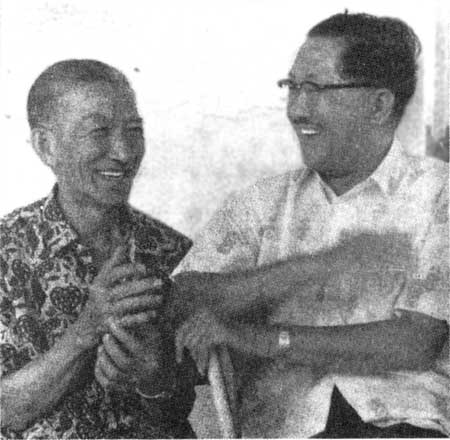
|
Macau Bahá'í Community in the Early Years
by Barbara R. Sims
 |
chapter 8 | start page | single page | chapter 10 |  |
Chapter 9
In 1965 Mr. Yan Kee Leong and Mr. Leong Tat Chee visited Hong Kong and Macau. They spent four days in Macau, arriving September 24 and leaving the 28th. They stayed with Mr. Chang and went around with him and Harry Yim. They reported that Mr. Yip and his daughter-in-law seemed inspired. Again in March 1968 the two staunch Bahá'í friends made another trip to Macau. Harry Yim reported that they had a "good time" together. They were the first Bahá'ís of Malaysia to go travel-teaching out of their country. They also went to Hong Kong and Taiwan. Mr. Yan spent much time in Hong Kong and Macau in later years also.

We have not been able to find a photo of either Mr. Yan Kee Leong or Mr. Leong Tat Chee taken while they were in Macau. The above photo was taken in Singapore 1969 where they were doing teaching and consolidation before Ridván.
One of the great assets of the Faith is the diversity of its adherents. Mr. Yan Kee Leong and Mr. Leong Tat Chee, both of whom have passed on, were remarkable men by any standard. They were Malaysians of Chinese ancestry, especially interested in spreading the Faith among the Chinese in any country.
Yan Kee Leong first heard of the Faith from Mrs. Shirin Fozdar and became a Bahá'í December 19, 1953. He was the first Bahá'í in Malaya, (now known as Western Malaysia) and he took the Faith to countless numbers of his fellow Malaysians, including some of the indigenous tribes of that country. In 1968 the Universal House of Justice appointed him to the Continental Board of Counsellors for Southeast Asia. He was the first counsellor of Chinese ancestry and he remained on that institution until his death in 1985. The second counsellor of Chinese ancestry was also Malaysian, Mrs. Rose Ong, daughter of Yan Kee Leong. She was appointed in 1985. Another daughter, Mrs. Lily Ng, affectionately known as "Auntie Lily", spent time teaching in Hong Kong and Macau in the late 1970s and 1980s.
Mr. Leong Tat Chee first heard of the Faith from Dr. Fozdar, who, with his wife, was pioneering to Singapore. Another inspired Bahá'í teacher, Mr. Leong was appointed to the Auxiliary Board in 1965. As with Mr. Yan Kee Leong, many members of his family became Bahá'ís.

click for larger image
Auxiliary Board Member Mrs. Orpha Daugherty went to Macau in February 1969 to help the progress of the Faith. She stayed two years. A devoted pioneer, warm and loving, she lived and taught the Faith in many countries in Asia. She died in 1985 in Taiwan.
At the end of the 1960s teaching in Macau lagged until Auxiliary Board Member Mrs. Orpha Daugherty came in February 1969 to help re-establish the Spiritual Assembly. It was elected in April 1969. Mrs. Daugherty stayed in Macau about two years.
A new Bahá'í Center, a large apartment, rented by the National Spiritual of North East Asia, was opened on Naw-Rúz 1969. At that time there were eleven adults and one youth on the Bahá'í list.
Mr. Leonard Lewis, a British man, a teacher by profession, became a Bahá'í in Hong Kong and remained there to pioneer. He visited the friends in Macau several times. He said Mr. Yim decorated the rented Macau Center with some of his beautiful antiques. The apartment was kept only a year or so.
Mr. Lewis admired the Bahá'ís of Macau. He wrote to the compiler that knowing how much the Chinese loved food, the fact that during the Fast they could go without food for the love of God, was quite remarkable!
Both Macau and Hong Kong were far away from the National Spiritual Assembly of North East Asia, whose seat was in Tokyo. Korea and Taiwan, originally a part of the National Spiritual Assembly of North East Asia had already formed their own National Spiritual Assemblies. It was just a matter of time when Hong Kong and Macau would leave the mother assembly and become independent. To assist in the process, the National Assembly in 1968 decided to appoint a large committee in Hong Kong which was called the National Administrative Committee. This committee took care of the teaching and much of the administrative work in Hong Kong and also Macau. Mrs. Mary Tung Shia, the first Chinese woman to become a Bahá'í in Macau was one of the Bahá'ís appointed to the new committee. She and her husband were then living in Hong Kong.
 |
chapter 8 | start page | single page | chapter 10 |  |
|
|